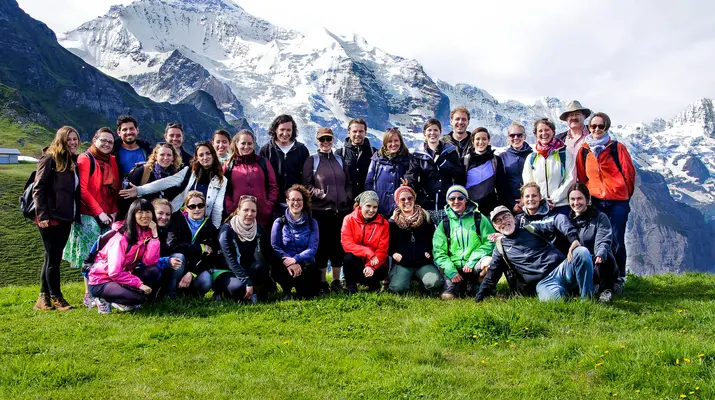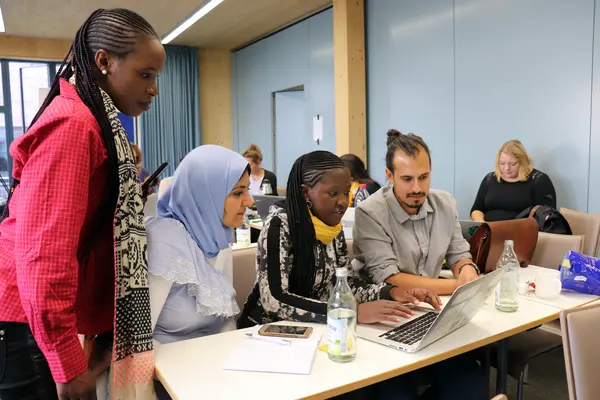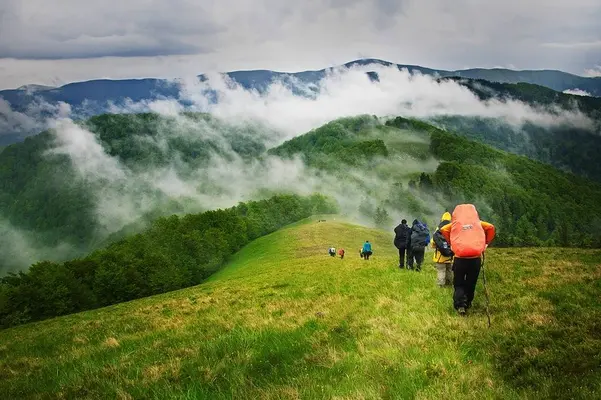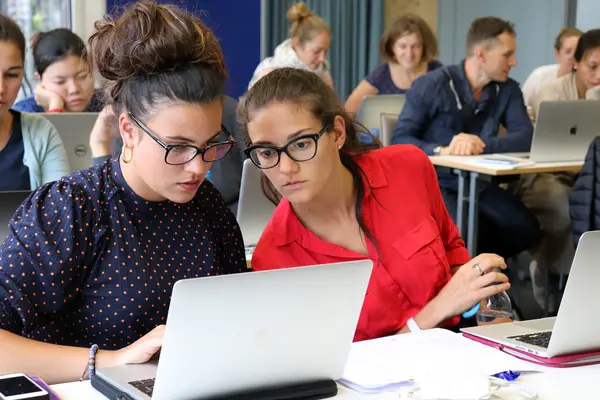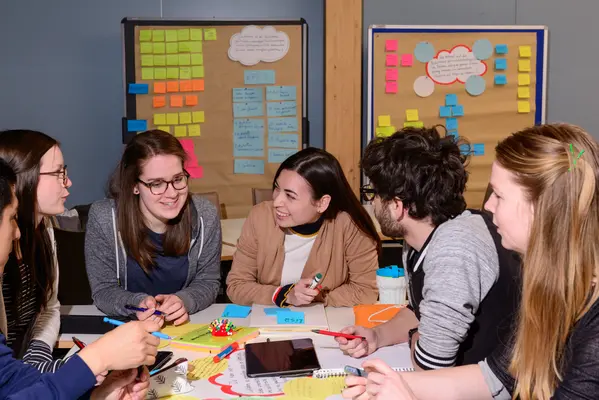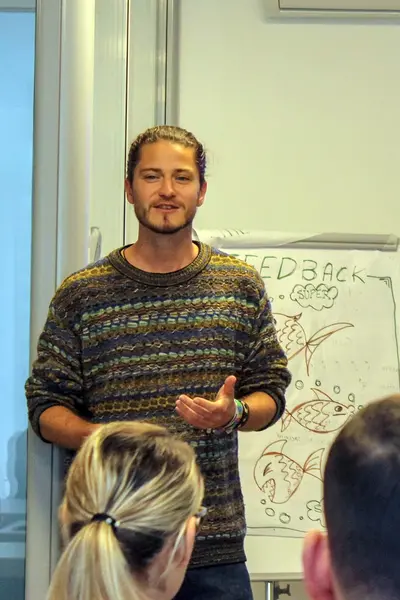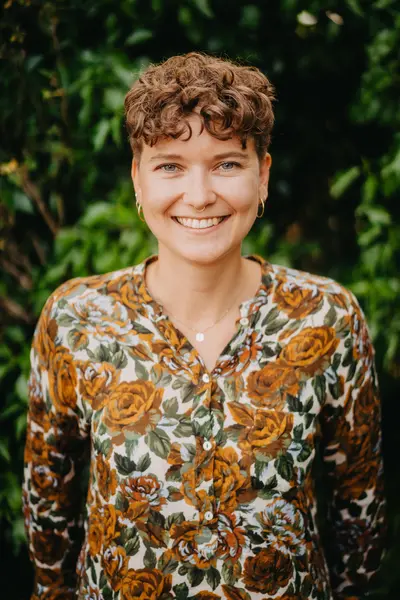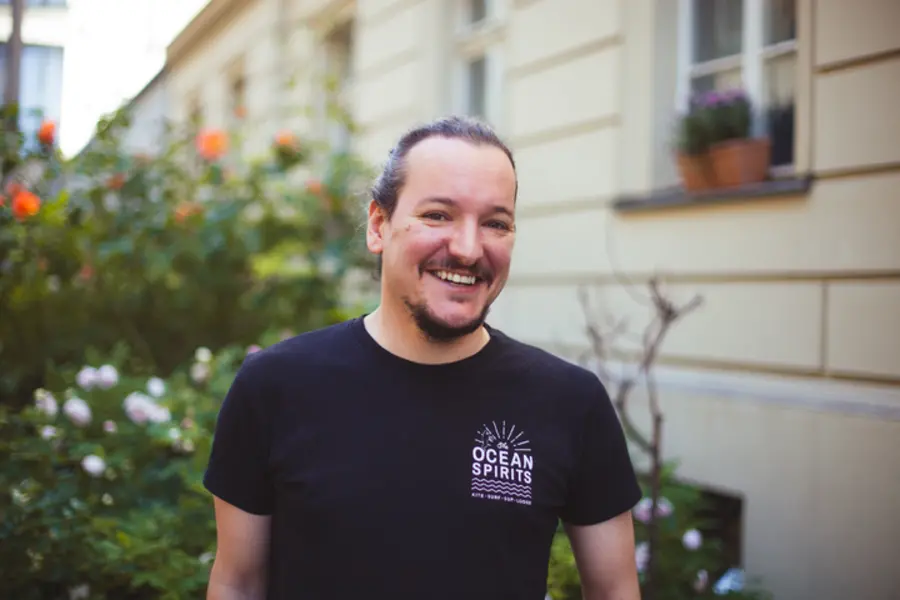Customised course content
The aim of the programme is to meet the requirements of modern tourism management with data-driven decisions in line with the 17 SDGs.
The programme covers all levels of the value chain (companies, destinations, politics) in both a German-speaking and international context.
The programme consists of seven semesters. In the first semester, we look at tourism in the destination but also in marketing and deepen our understanding of data and sustainability and the interplay between these two focal points.
In the second semester, we deepen our knowledge in a large applied project in direct implementation with partners from the industry, while in the third semester you get to know the destination in the context of sustainability and in the fourth semester you can choose from various compulsory elective modules to further deepen your knowledge. In the fifth and sixth semesters, you can choose between a practical project or a semester abroad. The programme ends with the Master's thesis in the seventh semester.
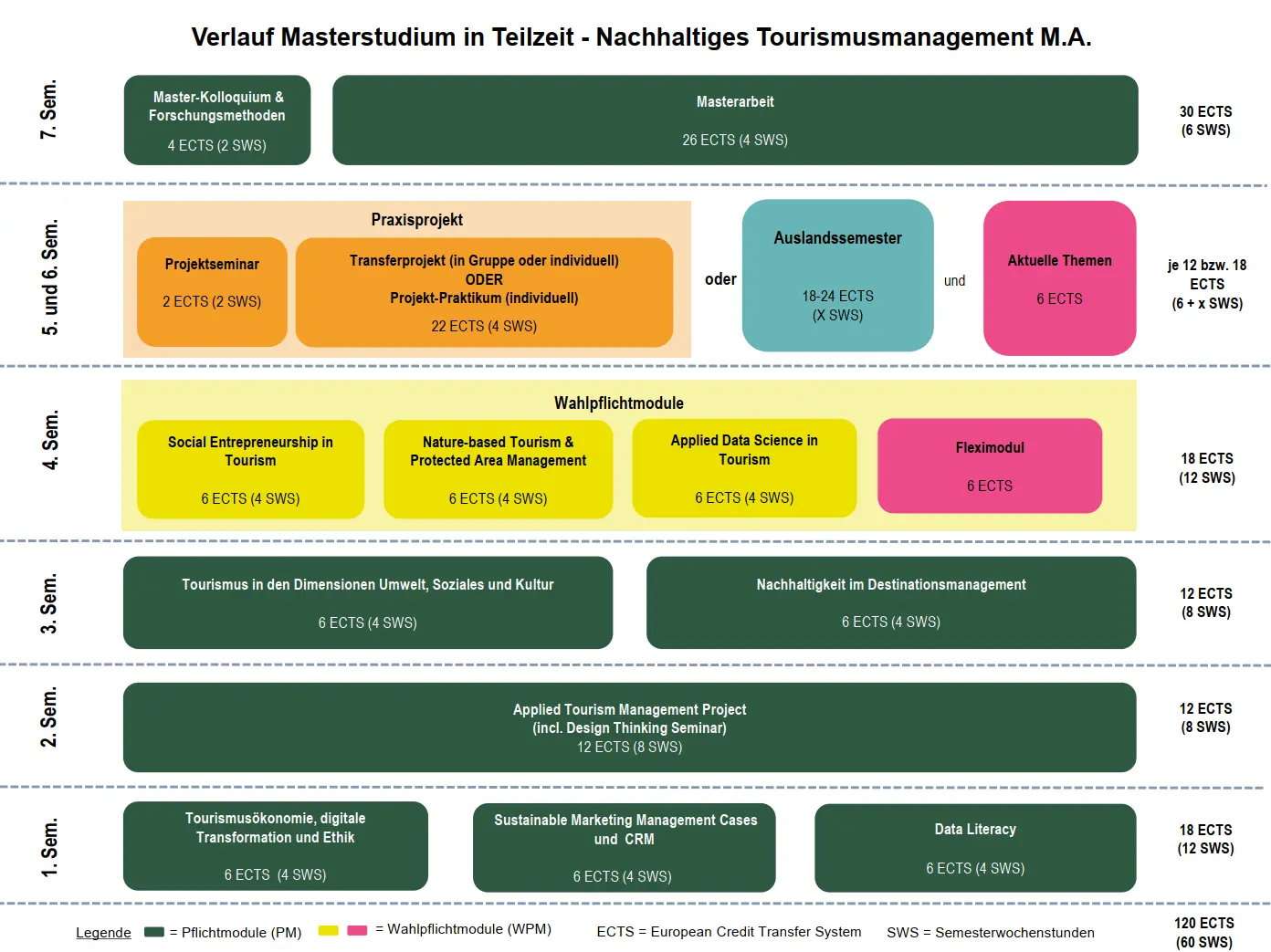
Modules per semester
In this module, we teach you about the economic aspects of the tourism industry, introduce you to digital business models, the internet and platform economy and the effects of digital transformation. We look at and discuss critical economic approaches and ethical aspects of digitalisation, the economy and the tourism industry.
The module teaches marketing basics and special features of tourism marketing. You will learn about marketing conception, planning, positioning, communication and distribution as a strategic approach to marketing. The course focuses on Sustainable Corporate Management in the field of marketing from a scientific and practical perspective.
Data literacy refers to the ability to handle data with confidence. You will learn how to find, generate, analyse, process and communicate data based on your own work with data.
In the mandatory module, teams are formed to work on a project for an external partner (e.g. tourism companies or destination management organisations). In a design thinking part, you will be instructed to work on the partner's question with creative solution approaches. The teams then carry out the project independently, accompanied by impulse lectures, and present the results to their partners in the form of a poster presentation.
In this module, you will receive an introduction to the basic principles of sustainable development, which we will then apply to tourism. Specifically, we will look at the ecological, social and cultural impacts of tourism on the one hand and approaches to making tourism more sustainable on the other. The economic dimension is covered in the "Tourism Economics" module in the 1st semester.
The module offers definitions of destination, destination management organisation (DMO), levels of spatial planning in Germany, EIA and impact regulation, tourism planning as a task of destination management, development of tourism concepts. You will gain knowledge about sustainability in destination development and sustainable mobility.
From the fourth semester onwards, you have the choice!
In general, at least four compulsory elective modules must be chosen during the course of the degree programme. In the 4th semester, you have at least four compulsory elective modules to choose from. The Fleximodule gives you the opportunity to take a module at other HNEE degree programmes or even at international partner universities, e.g. in Italy.
In the 5th semester, you can then select compulsory elective modules via the Current Topics module if you wish.
Alternatively, you can "save" a compulsory elective module and take part in the field trip in the sixth semester.
In the compulsory elective module, students work in a team to develop their own business concept or individually to develop an entry route into the labour market for social enterprises.
You will receive an introduction to nature conservation, conservation strategies, types of protected areas, protected area management, visitor management and infrastructure, nature and ecotourism offers, the economic importance of tourism for protected areas, UNESCO World Heritage sites, geo/star parks and tourism as well as national and international case studies.
The compulsory elective module provides a practice-orientated introduction to working with data to answer questions in tourism.
A compulsory elective module is offered here according to current topics. This could be "Environmental Management, Reporting and Certification", for example.
You will be prepared for the management of your project in a joint project seminar . This is followed by several individual appointments for consultation with the lecturer in charge of the project.
In a transfer project , students work in a group on a project for a practice partner. In doing so, they transfer knowledge from the university into practice. Transfer projects mainly take place in Brandenburg and Berlin, but can also be carried out in other regions of Germany or abroad.
You will complete your project internship individually. You will also develop a project for a practice partner. Practical partners for project internships and transfer projects can be, for example, tourism companies, associations or regions. They often emerge from the lecturers' diverse networks.
As an alternative to the project internship or the transfer project, you can also complete a semester abroad at a partner university on a comparable degree programme. For example, we have partnerships with two universities in Sardinia (Olbia, Cagliari) and a university in Mallorca (Illes Baleares). These are both English-language Master's study programmes.
You can choose compulsory elective modules from our programme as well as from certain other HNEE degree programmes or even from our international partner universities.
These include, for example, Regional Public Relations and Regional Marketing from the HNEE Sustainable Regional Development course or the organisation of our specialist excursion, which usually takes place in the following summer semester as the final module of the course.
If you still have a compulsory elective module open in the sixth semester, you are welcome to take part in our field trip to a European country. During the field trip, topics from the mandatory modules of the previous semesters are taken up and illustrated using examples in the target country. In the past, these have included England, Spain, Poland, Albania and Slovenia.
The colloquium deals intensively with the research process and the development of an academic thesis at Master's level. The preparation of your independent research and the associated report takes the form of a Master's thesis. Finally, you will defend your Master's thesis in an oral presentation.
FAQ Study contents
Classes usually take place from Monday to Friday from 9.30 a.m. to 3.15 p.m. as block teaching. In special cases (e.g. guest lecturers), the teaching times may vary and sometimes take place at the weekend.
We offer this degree programme as a full-time and part-time option.
You are very free to choose your internship partner and the project topic within certain guidelines (e.g. tourism and sustainability-related, technical requirements). We will brief you on the practical semester and the requirements in two information events. After a successful search, the internship partner and project topic must also be informally approved by the internship semester coordinator and all three parties conclude an agreement.
However, our internship semester officer and our lecturers also receive numerous offers from our partners, some of whom have been with us for many years, which they make available to you in a bundled form. If you need further help with your search, our internship semester officer will be happy to assist you.
You can also find offers for practical projects in the Career Service job portal.
Yes, you can. However, we only recommend that you aim for a semester abroad if you have already gained sufficient and relevant practical experience.
In a project internship, you are integrated into a company and complete an internship of at least 15 weeks. In a transfer project, you are not integrated into a company, but rather take on the role of a tourism consultant who develops a well-founded project for a practice partner. A transfer project lasts 17 weeks and can also be worked on in a group with fellow students.
You can spend a semester abroad at one of our international partner universities with which we have signed a Memorandum of Understanding. These are currently:
| Country | University | Degree programme | Semester abroad | Transfer project | Project internship | Compulsory elective modules | Double degree |
|---|---|---|---|---|---|---|---|
| Sweden (Gotland) | Uppsala University | Sustainable Destination Development | yes | yes | yes | no | yes no |
| Czech Republic | Palacky University Olomouc | Department of Recreation and Leisure Studies | no | yes | yes | yes* | no |
| Croatia | University of Rijeka | Sustainable Tourism Development | no | no | no | yes* | no |
| Italy (Sardinia) | University of Sassari | Innovation Management for Sustainable Tourism | yes | yes | yes | yes* | yes |
| Italy (Sardinia) | UNICA University of Cagliari | Sustainable Tourism Management and Monitoring | yes | Yes | yes | no | no |
| Spain (Mallorca) | Universitat de les Illes Baleares | Master in Economics of Tourism: Monitoring and Evaluation | yes | yes | yes | no | yes no |
| Dominican Republic | Pontificia universidad Católica Madre y Maestra | no | yes | yes | no | no |
With a few exceptions, the classes take place in person.
This depends on the module and the excursion destination. If the field trip takes place within Berlin or Brandenburg, at least the transport costs are usually covered by your Eberswalde Greencard.
Costs (usually no more than €500) are incurred for the field trip, which you can, but do not have to, take in the 4th semester as a special compulsory elective module.
